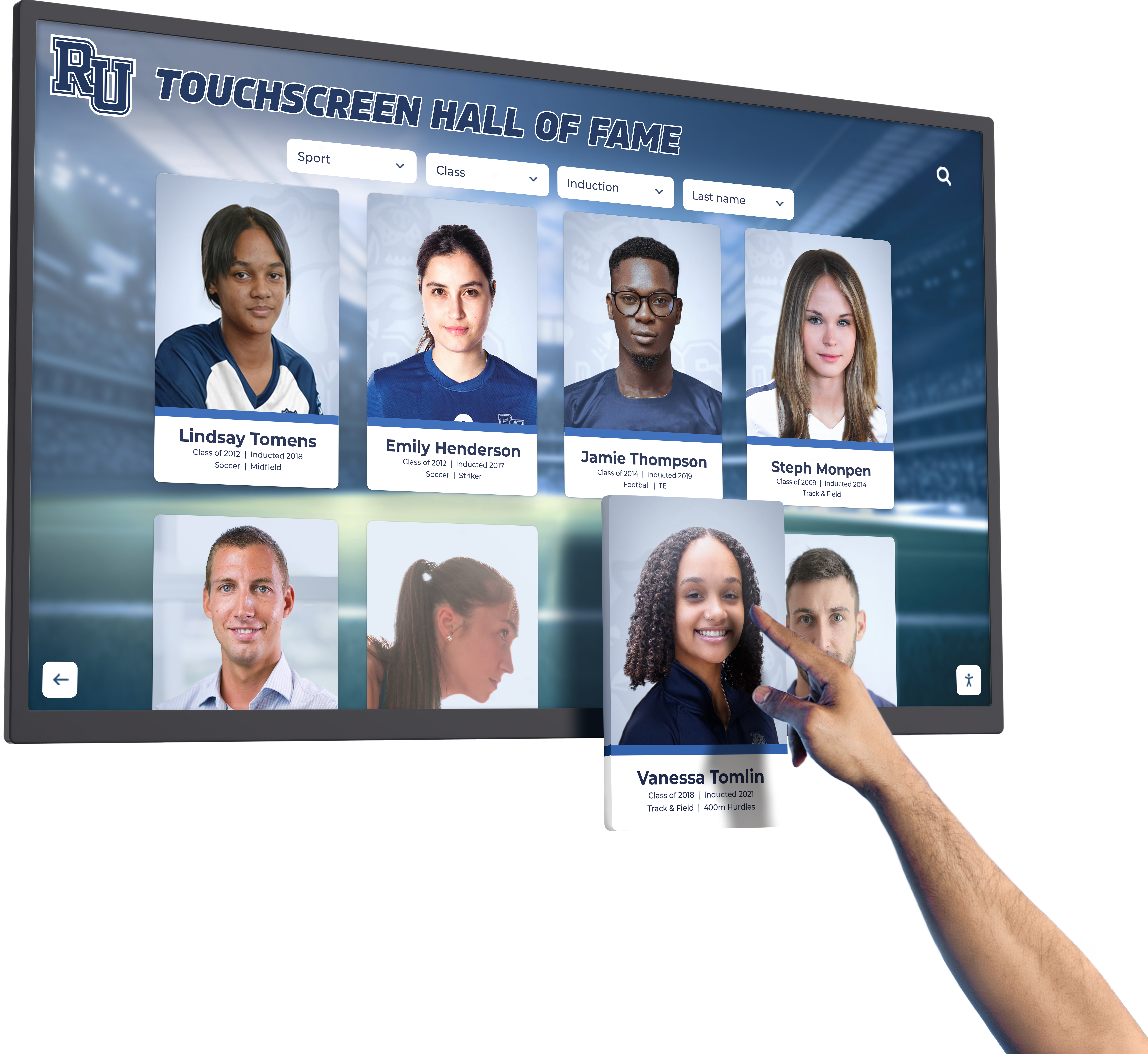Introduction: The Evolution of Achievement Recognition
For decades, schools and organizations have recognized all-star athletes and top performers through traditional methods: engraved plaques mounted on walls, trophy cases filled with hardware, and bulletin boards featuring printed photos and statistics. While these approaches have served their purpose, they present significant limitations in today’s digital age where engagement, accessibility, and dynamic content drive meaningful connections with audiences.
Modern touchscreen achievement displays—often called “all-star achievement touchscreens” or interactive recognition systems—solve the fundamental challenges that plague traditional recognition methods: limited space for displaying achievements, difficulty updating information as new records are set, poor visibility for older accomplishments buried in crowded trophy cases, and inability to tell complete stories behind the achievements being honored.
This comprehensive guide explores everything you need to know about implementing touchscreen achievement displays in your organization, from understanding the technology and benefits through planning, implementation, and best practices for creating recognition programs that truly inspire and engage your community while preserving your legacy of excellence.
Understanding Touchscreen Achievement Display Technology
Before exploring specific applications and benefits, understanding the technology underlying modern achievement displays helps organizations make informed decisions about implementation.
Core Technology Components
Display Hardware:
Modern achievement touchscreens typically utilize commercial-grade displays ranging from 43 to 86 inches, with most installations using 55-75 inch screens that balance visibility with space constraints and budget considerations:
Commercial Display Features:
- High-brightness panels (350-700 nits) ensuring visibility in various lighting conditions
- Commercial-grade components rated for continuous 16-24 hour daily operation
- Enhanced durability with reinforced panels and industrial-strength construction
- Extended warranties (3-5 years) providing long-term reliability assurance
- Professional mounting systems supporting secure wall or kiosk installation
- Thermal management preventing overheating during extended operation
Touchscreen Technology:
- Infrared or capacitive touch supporting multi-touch gestures
- 20-40 touch points enabling simultaneous user interaction
- Responsive performance with minimal lag or delay
- Durable construction withstanding high-traffic public environments
- Easy cleaning and maintenance for hygiene and appearance
- Vandal-resistant glass protecting display investment
For guidance on selecting appropriate hardware specifications, explore comprehensive hardware selection guides for digital recognition displays that examine display options, mounting systems, and technical requirements.
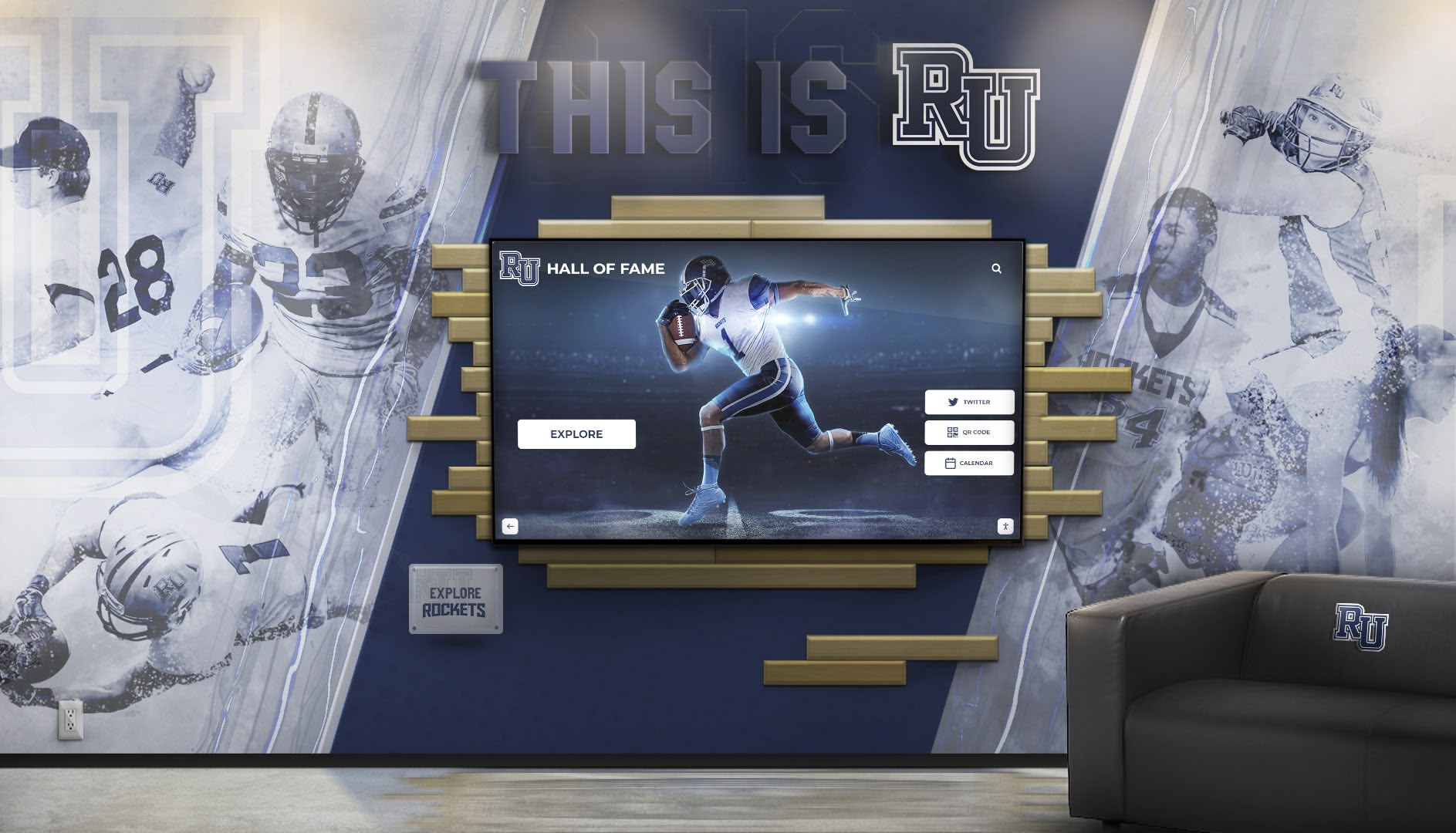
Software and Content Management:
The software platform powering your achievement display determines how easily you can update content, what features are available to users, and how maintainable the system will be over time:
Essential Software Capabilities:
- Intuitive content management system requiring no technical expertise
- Responsive touchscreen interface optimized for user interaction
- Flexible content organization supporting multiple achievement categories
- Rich multimedia support including photos, videos, and statistics
- Search and filter functionality helping users find specific achievements
- Mobile-responsive web version extending access beyond physical display
- Automated backup systems protecting your content investment
- Regular software updates maintaining security and adding features
Interactive Features That Drive Engagement
The true power of touchscreen achievement displays lies in their interactive capabilities that static displays cannot replicate:
User Interaction Methods:
Browse and Exploration:
- Visual category selection (by sport, year, achievement type, etc.)
- Timeline views showing achievement progression over decades
- Photo galleries celebrating individual and team accomplishments
- Video highlights capturing memorable performances
- Statistical records with historical context and comparisons
- Related content suggestions encouraging deeper exploration
Search and Discovery:
- Name search finding specific individuals or teams quickly
- Filter options narrowing results by multiple criteria
- Year range selection focusing on specific eras
- Achievement type filtering (records, championships, awards)
- Keyword search across all content and descriptions
- Advanced search combining multiple parameters
These interactive capabilities transform passive viewing into active engagement, with users typically spending 3-5 times longer exploring touchscreen displays compared to traditional static recognition walls.
Benefits of Touchscreen Achievement Displays
Organizations implementing interactive achievement displays report significant advantages across multiple dimensions compared to traditional recognition methods.
Unlimited Recognition Capacity
Space Constraints Eliminated:
Traditional trophy cases and plaque walls face inevitable space limitations—eventually every organization runs out of wall space or display capacity, forcing difficult decisions about which achievements to display and which to relegate to storage or archives.
Touchscreen achievement displays eliminate this constraint entirely:
- Unlimited digital capacity accommodating decades or centuries of achievements
- All honorees equally accessible regardless of when they were recognized
- No prioritization needed between recent and historical achievements
- Easy addition of new content without removing existing recognition
- Archival information preserved and accessible rather than lost to time
- Multi-category organization without competing for limited physical space
For schools with rich athletic traditions spanning decades, digital trophy displays provide comprehensive recognition capacity that traditional trophy cases simply cannot match.
Dynamic Content Updates
Real-Time Recognition:
Traditional displays require physical updates—ordering new plaques, printing and mounting photos, physically arranging trophies—creating delays between achievements occurring and recognition appearing. This lag diminishes the impact and excitement of recognition.
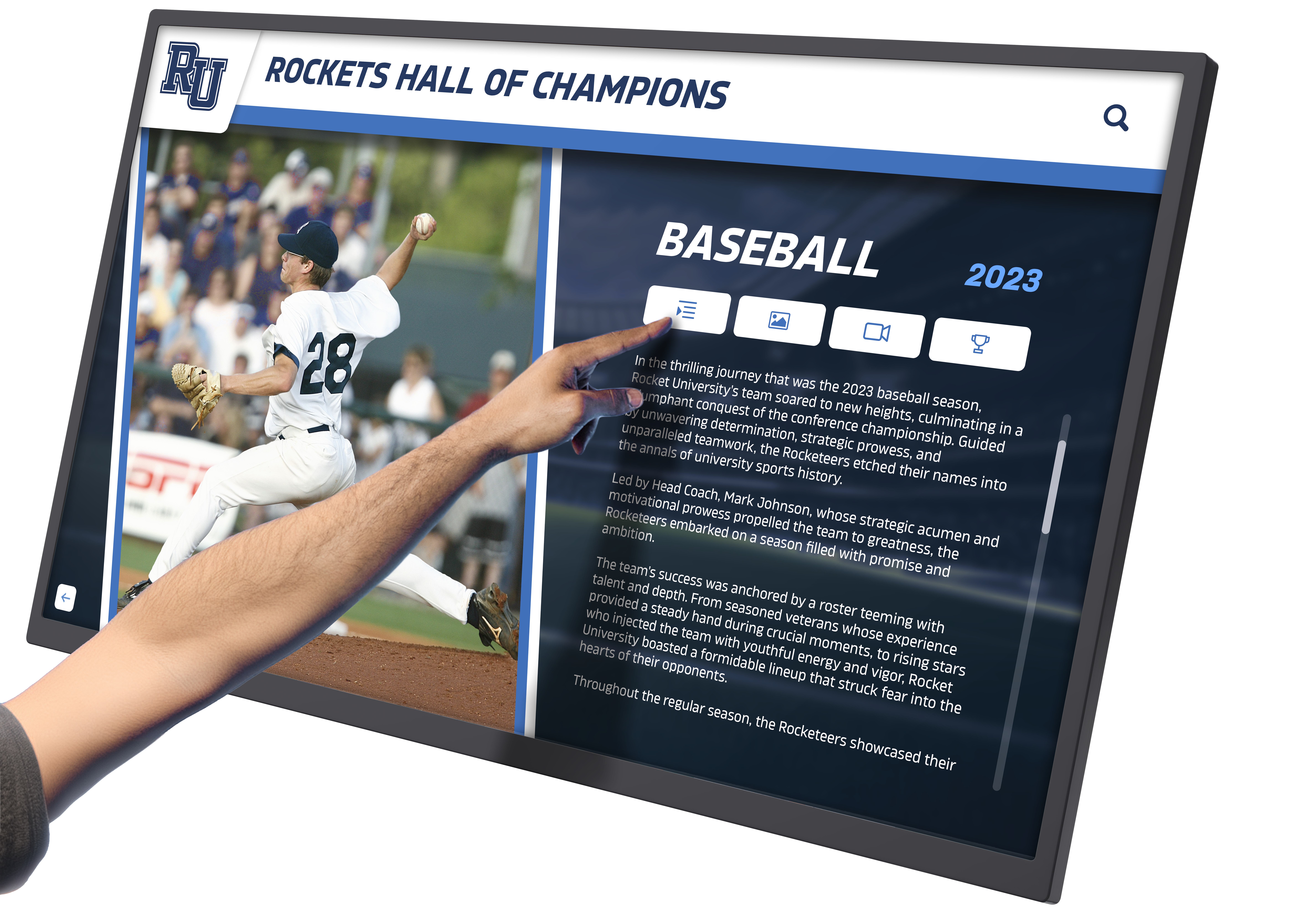
Touchscreen systems enable immediate updates:
Instant Recognition Capability:
- Update content within minutes of achievements occurring
- Add breaking records during ongoing competitions or events
- Feature current season highlights and statistics in real-time
- Spotlight upcoming events and recognition ceremonies
- Share news and announcements alongside historical achievements
- Rotate featured content maintaining fresh, current displays
This immediacy transforms recognition from historical documentation into living celebration that connects directly with current programs and participants.
Comprehensive Storytelling
Beyond Names and Dates:
Traditional plaques typically contain minimal information: a name, achievement, and date. Trophy cases display hardware with small plaques. These limited formats fail to tell the complete stories behind achievements or provide context that makes recognition meaningful to audiences unfamiliar with the individuals being honored.
Touchscreen displays enable rich, comprehensive storytelling:
Multimedia Recognition Content:
- Biographical information providing context about individuals and teams
- Photo galleries showing athletes or performers in action
- Video highlights capturing defining moments and performances
- Audio interviews featuring first-person recollections and reflections
- Statistical context explaining significance of achievements
- Historical background describing conditions and competition
- Related content linking to teammates, coaches, and concurrent achievements
Similar to how digital hall of fame displays support storytelling, achievement touchscreens transform recognition from simple acknowledgment into compelling narratives that engage audiences and preserve institutional memory.
Cost-Effective Long-Term Operations
Total Cost of Ownership Analysis:
While touchscreen displays require higher initial investment compared to traditional plaques or trophy cases, their long-term cost structure often proves more favorable:
Traditional Recognition Costs (Ongoing):
- New plaques for each achievement: $75-$300 each
- Trophy case expansion or renovation: $5,000-$25,000
- Physical installation labor: $100-$500 per installation
- Space constraints eventually requiring difficult decisions
- Maintenance, cleaning, and rearrangement time
- Environmental damage or theft requiring replacement
Touchscreen Recognition Costs (After Initial Investment):
- Content updates: staff time only (no material costs)
- Unlimited capacity without additional hardware needed
- Software licensing: $1,200-$4,000 annually
- Minimal maintenance: cleaning and occasional technical support
- 5-7 year lifespan for commercial-grade displays
- Upgrade path through software updates rather than hardware replacement
For organizations recognizing 10-20 new achievements annually, digital displays typically achieve cost parity within 3-4 years while providing significantly enhanced recognition experiences.
Applications for Athletic Achievement Recognition
Athletic programs represent one of the most natural and impactful applications for touchscreen achievement displays, with specific features and content types particularly valuable for sports recognition.
Sports Record Boards and Achievement Tracking
Comprehensive Record Management:
Traditional record boards require physical updates each time a record falls, creating maintenance challenges and limiting how much historical context can be displayed alongside current records.
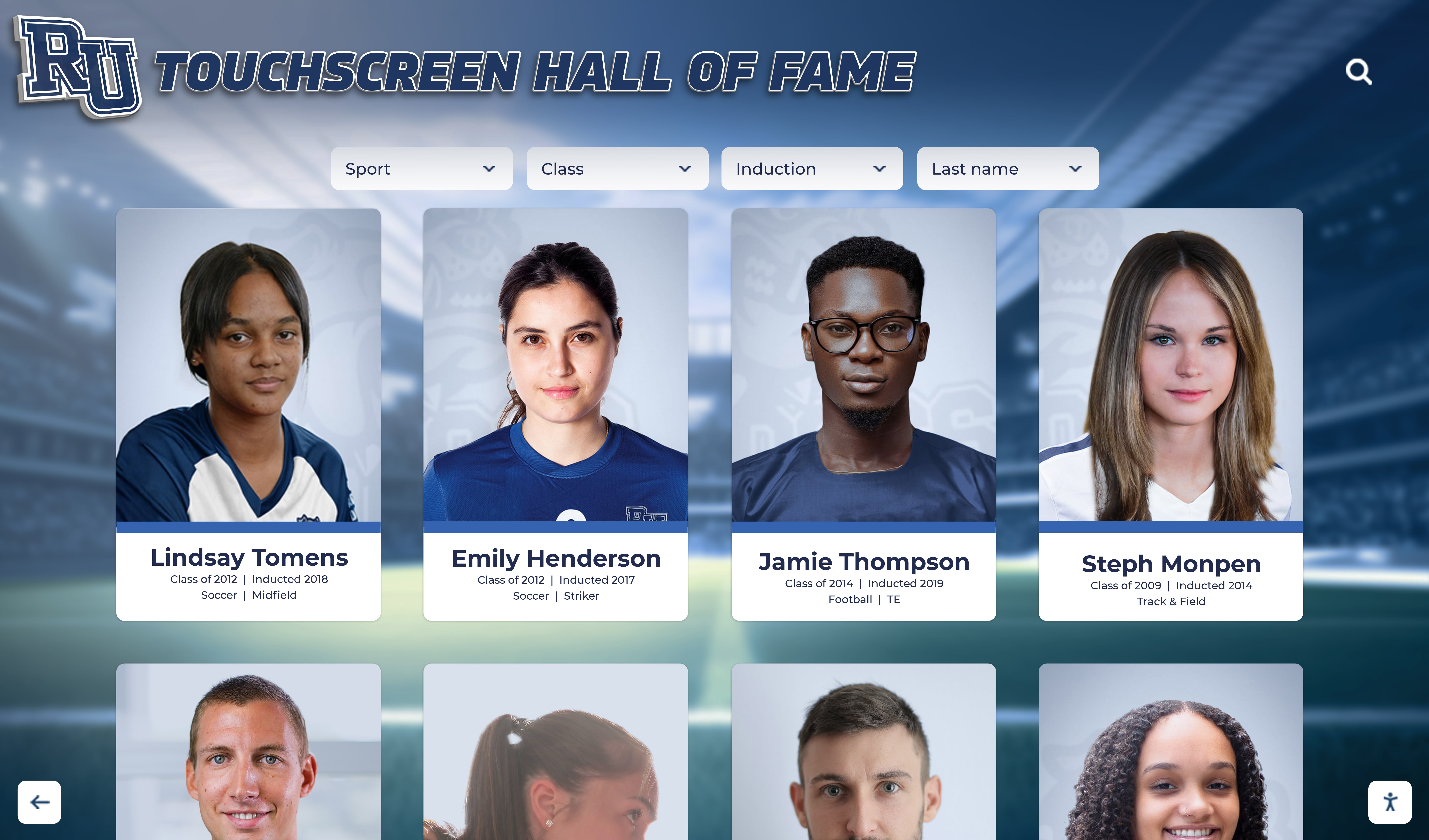
Touchscreen record boards transform this experience:
Interactive Record Board Features:
- Current records for all sports programs in one centralized location
- Historical record progression showing how marks have improved over time
- Record holder profiles with photos, biographical information, and achievements
- Statistics and context explaining the significance of performances
- Conditions and competition details providing complete record documentation
- Related achievements linking to team accomplishments and concurrent records
- Comparison tools showing current athlete performance versus records
Schools successfully implementing digital record boards report increased athlete motivation as current performers can easily see records they’re pursuing and track their progress throughout seasons.
All-Conference and All-State Recognition
Honor Roll of Excellence:
Athletic programs regularly produce athletes earning all-conference, all-state, all-region, and all-American recognition. Traditional displays struggle to comprehensively recognize these achievements due to space constraints and the volume of recipients over time.
Touchscreen systems solve this challenge:
All-Star Recognition Features:
- Complete rosters of all-conference and all-state recipients by sport and year
- Individual profiles celebrating each recipient’s achievements and contributions
- Team photos and action shots from seasons when honors were earned
- Statistical accomplishments supporting selection and demonstrating excellence
- Multiple honor recognition (athletes earning selections multiple years or sports)
- Filter and search capabilities helping users find specific athletes or years
- Historical perspective showing program tradition of producing honored athletes
This comprehensive recognition demonstrates program excellence while honoring every athlete who earned distinction, not just the most recent or highest-profile selections.
Championship and Team Achievement Displays
Celebrating Collective Success:
Team championships, tournament appearances, winning seasons, and milestone victories represent collective achievements that traditional displays struggle to capture comprehensively.
Championship Documentation:
- Complete championship history for all sports programs
- Team rosters identifying every contributor to championship success
- Season statistics and records documenting dominant performances
- Tournament brackets and progression to championships
- Game-by-game results and scores from championship seasons
- Coach profiles recognizing leadership behind championship teams
Multimedia Championship Content:
- Team photos capturing championship squads
- Video highlights showing key moments and defining plays
- Newspaper clippings and media coverage from championship runs
- Audio interviews with coaches, players, and community members
- Celebration photos showing trophy presentations and recognition events
- Historical context comparing to other program achievements
For schools with rich traditions producing numerous championships across multiple sports, interactive athletic recognition displays provide the capacity to honor all achievements while helping current teams understand the tradition they’re building upon.
Coaching Legends and Contributor Recognition
Honoring Program Builders:
Athletic success depends on outstanding coaching, dedicated support staff, generous boosters, and committed volunteers. These contributors deserve recognition alongside the athletes they supported.
Coaching Recognition Content:
- Career records and accomplishments for coaches past and present
- Championship teams and tournament appearances under their leadership
- Notable players and individual athletes developed during their tenure
- Photos and videos capturing their coaching style and personality
- Biographical information providing career context and background
- Tributes and testimonials from former players and colleagues
- Historical perspective on their impact and program legacy
Academic and All-Around Achievement Recognition
While athletic applications often receive focus, touchscreen achievement displays serve academic excellence, performing arts, and comprehensive student recognition equally well.
Academic All-Stars and Scholar Recognition
Celebrating Intellectual Excellence:
Academic achievement deserves recognition parallel to athletic success, yet often receives less visible celebration in school hallways and public spaces.
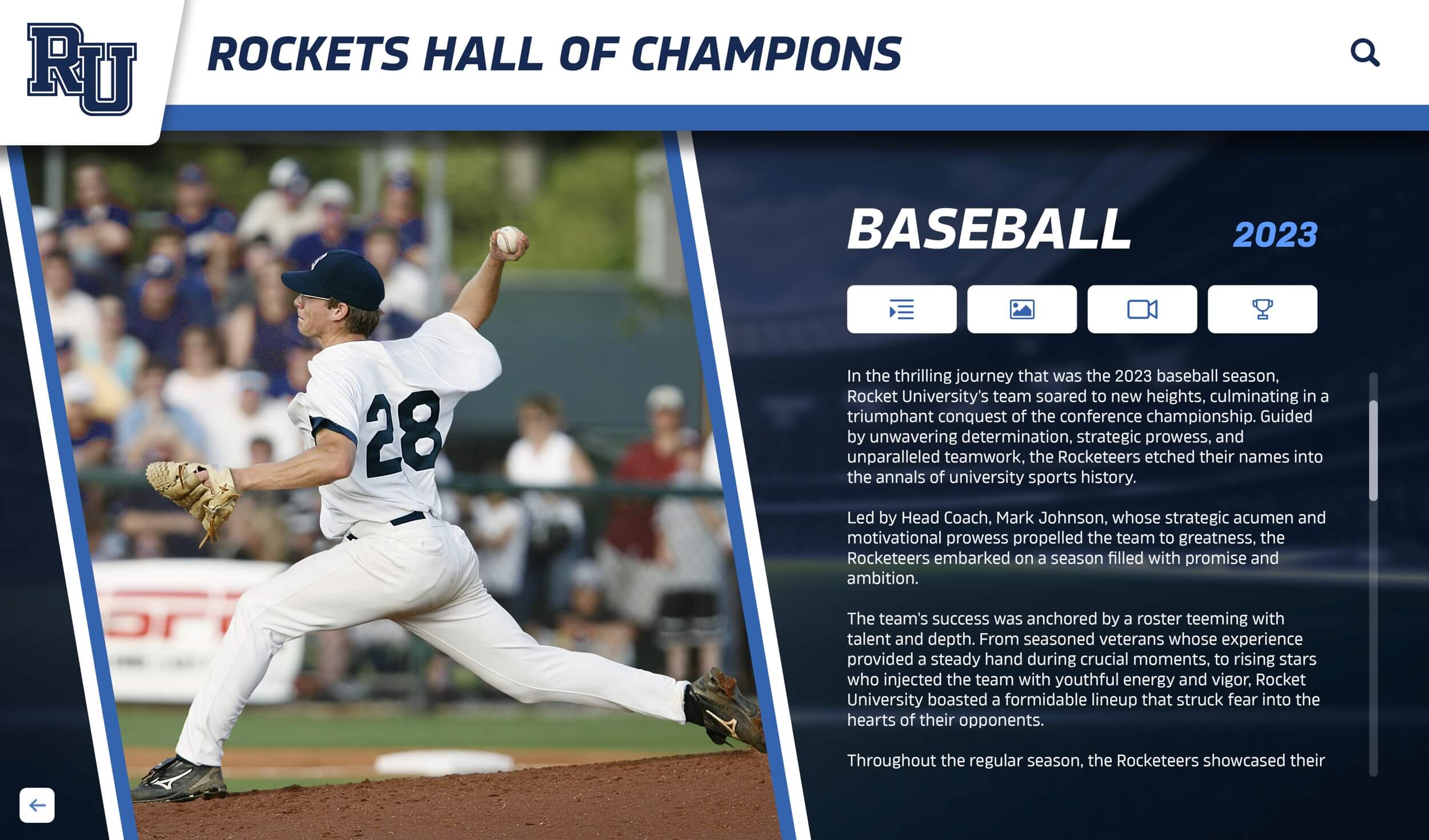
Academic Achievement Recognition:
- Valedictorians and salutatorians from every graduating class
- National Merit Scholars and prestigious scholarship recipients
- Academic All-State and All-American selections
- Subject-specific awards and recognition (science fair, writing competitions, math olympiad)
- Perfect attendance and academic excellence award recipients
- College acceptance and scholarship achievement showcasing
- GPA and class rank acknowledgment for top scholars
For comprehensive academic recognition strategies, explore top academic achievements worthy of wall of fame recognition to understand which accomplishments resonate most with students and families.
Performing Arts and Extracurricular Excellence
Beyond Athletics and Academics:
Well-rounded recognition programs celebrate excellence across all domains where students excel: performing arts, service, leadership, and specialized programs.
Comprehensive Achievement Categories:
Performing Arts Recognition:
- All-state music, choir, and band selections
- Lead roles in theatrical productions
- Competition victories (debate, forensics, one-act play)
- Individual and ensemble superior ratings
- Distinguished performance awards and honors
- Featured student performances and recitals
Leadership and Service:
- Student government leaders and officers
- Service hour achievements and community impact
- National Honor Society members
- Leadership award recipients
- Club and organization founders and officers
- Special recognition and citizenship awards
This comprehensive approach demonstrates that excellence takes many forms and all achievements deserve celebration, creating more inclusive recognition programs that engage broader segments of the student body.
Distinguished Alumni Achievement Recognition
Honoring Those Who Came Before:
Alumni who achieve distinction in their careers or make significant contributions back to their alma mater deserve recognition that connects current students with inspiring role models and institutional legacy.
Alumni Recognition Content:
- Professional accomplishments and career achievements
- Community service and philanthropic contributions
- Distinguished alumni award recipients and hall of fame inductees
- Support and giving back to programs and institutions
- Biographical information and career journeys
- Video messages and advice to current students
- Photos from their time at the institution and present day
Solutions like Rocket Alumni Solutions specialize in creating comprehensive digital recognition systems that connect current students with inspiring alumni role models while supporting institutional advancement and alumni engagement goals.
Planning Your Touchscreen Achievement Display Implementation
Successful implementation requires careful planning addressing technical requirements, content strategy, budget considerations, and organizational alignment.
Needs Assessment and Goal Setting
Defining Your Recognition Objectives:
Before selecting technology or planning implementation, clearly define what you want your achievement display to accomplish:
Primary Objectives Assessment:
- Which achievement categories will you recognize (athletics, academics, arts, all)?
- What is your primary audience (current students, alumni, visitors, community)?
- How will success be measured (engagement, awareness, inspiration)?
- What problems are you solving (space constraints, outdated information, poor visibility)?
- What is your content depth goal (comprehensive historical or recent focus)?
- How will this integrate with other recognition programs and initiatives?
Clear objectives guide all subsequent decisions about features, content requirements, technology selection, and budget allocation.
Location Planning and Installation Requirements
Optimal Placement Strategy:
Location selection dramatically impacts effectiveness and usage:
High-Performance Locations:
- High-traffic areas where students and visitors naturally congregate
- Near athletic facilities for sports-focused installations
- Main entrances or lobbies where visitors encounter displays immediately
- Adjacent to trophy cases or existing recognition displays
- Areas with adequate stopping space for groups to gather and explore
- Locations with appropriate lighting avoiding glare and reflections
For detailed guidance on installation best practices, review common mistakes to avoid when installing recognition displays to ensure your investment delivers maximum impact and longevity.
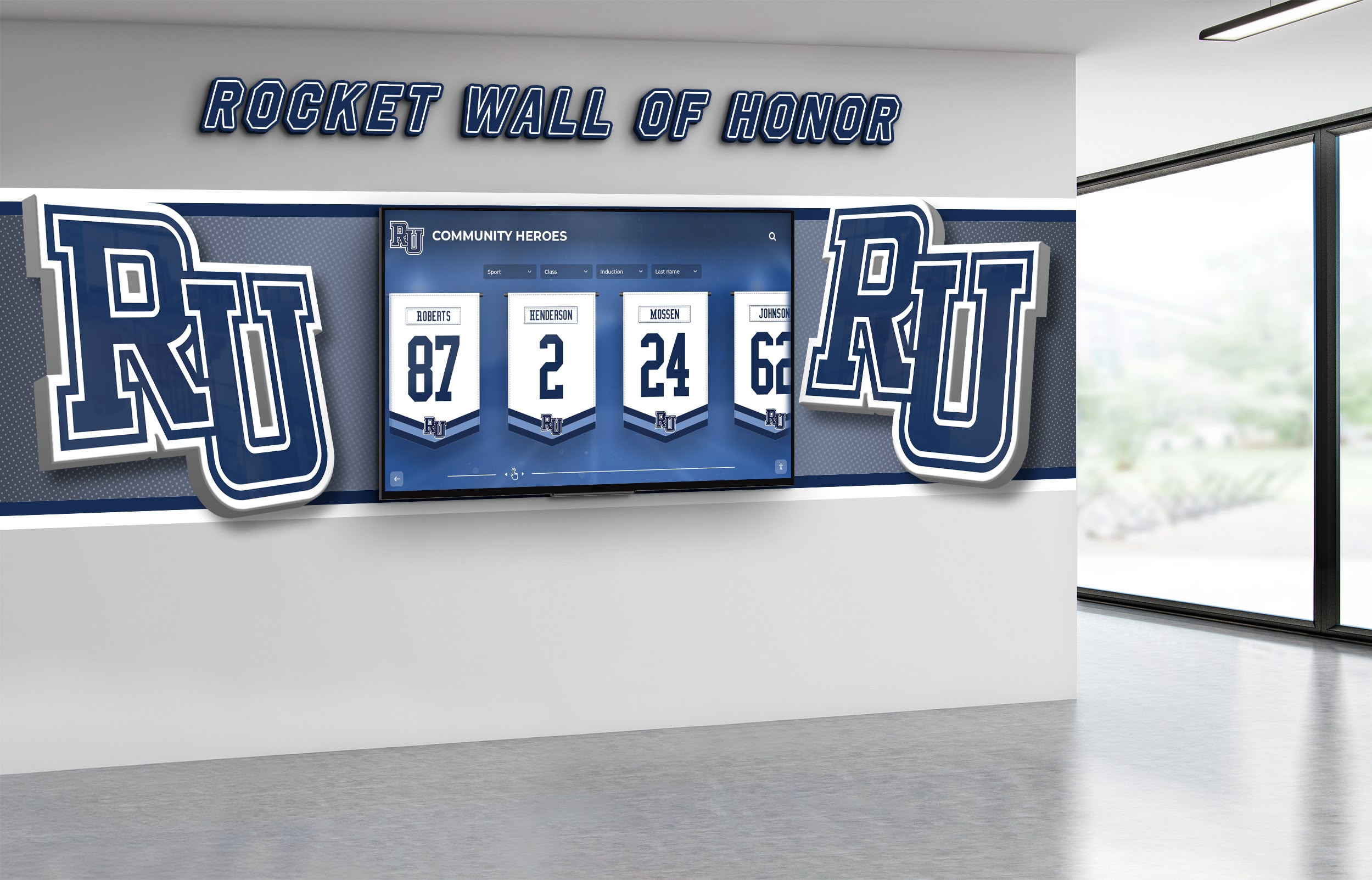
Technical Infrastructure Requirements:
- Electrical power with dedicated circuit
- Network connectivity (wired Ethernet strongly preferred)
- Wall structure adequate for mounting large displays securely
- Climate-controlled environment within display operating specifications
- Adequate clearance and approach space meeting accessibility requirements
- Security considerations protecting equipment investment
Content Strategy and Collection
Building Your Achievement Database:
Content quality and comprehensiveness determine how valuable and engaging your display will be:
Content Collection Process:
- Historical Achievement Inventory: Document all historical achievements you want to include
- Asset Gathering: Collect photos, statistics, newspaper clippings, and supporting materials
- Information Standardization: Create consistent data formats and required fields
- Photo Digitization: Scan historical photos and ensure adequate resolution
- Research and Verification: Confirm accuracy of achievements, dates, and statistics
- Profile Development: Create biographical content and achievement narratives
- Quality Review: Verify content accuracy, consistency, and completeness
Minimum Launch Content Recommendations:
- 70-80% of planned content completed before public launch
- All high-priority and recent achievements fully populated
- Enough content depth that displays appear rich and comprehensive
- Quality standards consistent across all content categories
- Photos and multimedia content for major achievements
For effective content planning strategies, explore content planning guides for digital recognition that outline best practices for building and maintaining robust achievement databases.
Budget Planning and Investment Analysis
Comprehensive Cost Considerations:
Understanding total costs enables realistic planning and stakeholder buy-in:
Initial Implementation Investment:
Hardware Components:
- Commercial touchscreen display (55-65"): $3,000-$8,000
- Mounting system or kiosk enclosure: $500-$2,500
- Media player or computer: $800-$2,000
- Installation labor and electrical work: $1,000-$3,000
- Total hardware investment: $5,300-$15,500
Software and Content:
- Software platform licensing: $2,000-$5,000 first year
- Content development and digitization: $2,000-$8,000
- Staff training and change management: $500-$2,000
- Project management and implementation: $1,000-$3,000
- Total software/content investment: $5,500-$18,000
Total Initial Investment Range: $10,800-$33,500 for standard implementations
Ongoing Operational Costs:
- Annual software licensing: $1,200-$4,000
- Content updates and management: $800-$2,500 (staff time)
- Technical support and maintenance: $500-$1,500
- Total annual operating costs: $2,500-$8,000
For comprehensive budget planning guidance, review planning and budget considerations for digital recognition projects that examine total cost of ownership and ROI calculations.
Best Practices for Maximizing Engagement and Impact
Successful achievement displays require more than technology and content—they need strategic approaches that drive engagement and deliver lasting value.
User Experience Design Principles
Creating Intuitive Interfaces:
User experience determines whether your achievement display becomes heavily used or largely ignored:
Interface Design Best Practices:
- Large, clearly labeled navigation buttons and options
- Maximum 3 levels from home screen to any content
- Prominent search functionality for quickly finding specific achievements
- Visual category selection with photos or icons representing each option
- Consistent navigation patterns throughout the application
- Clear visual hierarchy emphasizing most important content and actions
- Feedback confirming selections and system responsiveness
- Timeout returning to home screen after inactivity
Content Organization Strategies:
- Multiple pathways to content (browse by sport, year, athlete name, achievement type)
- Logical groupings matching how users think about achievements
- Featured content highlighting notable or recent achievements
- Related content suggestions encouraging exploration beyond initial interest
- Filter and sort options helping users narrow large result sets
- Breadcrumb navigation showing current location and path taken
Keeping Content Fresh and Current
Sustainable Update Processes:
Achievement displays lose value when content becomes outdated or stale:
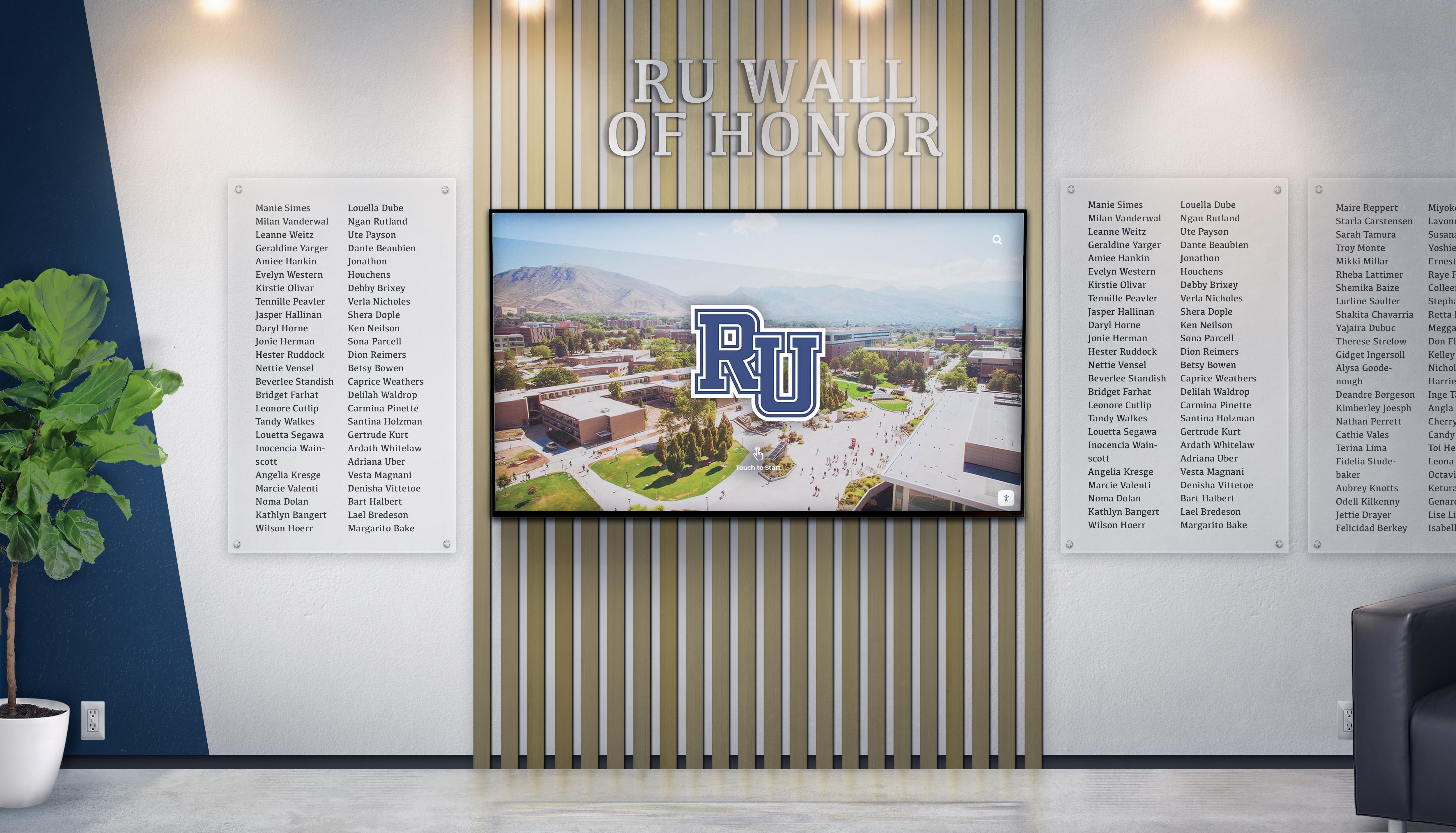
Content Update Workflows:
Regular Update Schedule:
- Weekly: New achievements and records as they occur during seasons
- Monthly: Featured content rotation highlighting different achievements
- Quarterly: Major content additions and profile enhancements
- Annually: Comprehensive review and historical content additions
Sustainable Management Practices:
- Designate specific staff responsible for content updates
- Create simple processes for coaches and advisors to submit achievements
- Establish quality standards and review procedures before publishing
- Train multiple staff members on content management system
- Document procedures ensuring continuity during staff transitions
- Plan time in staff responsibilities for recognition display maintenance
For detailed guidance on maintaining recognition displays, explore maintenance and troubleshooting guides that help ensure long-term system performance and content currency.
Promoting and Driving Awareness
Maximizing Visibility and Usage:
Even exceptional displays require promotion to reach their potential:
Launch and Promotion Strategies:
- Dedicated launch event or ceremony with stakeholders, students, and community
- Media coverage in local newspapers and community publications
- Social media campaign showcasing featured achievements and interface
- Student orientation and tour integration highlighting the display
- Parent communication explaining the new recognition resource
- Alumni newsletter features driving awareness among former students
- Integration with athletic events and academic ceremonies
Ongoing Engagement Activities:
- Feature specific achievements or athletes through social media “spotlights”
- Encourage students to explore displays finding connections to family or community
- Create contests or scavenger hunts engaging students with content
- Reference displays during announcements and recognition ceremonies
- Update signage directing visitors to display locations
- Gather and share user testimonials and engagement stories
Measuring Success and Demonstrating Value
Documenting the impact of your achievement display investment builds support for ongoing resources and potential expansion.
Quantitative Metrics and Analytics
Measurable Performance Indicators:
Modern achievement display platforms provide analytics revealing usage patterns and engagement:
Key Performance Metrics:
- Daily interaction counts showing how many users engage
- Average session duration indicating depth of engagement
- Most viewed content identifying which achievements resonate most
- Search queries revealing what users are looking for
- Return visitor percentage showing sustained interest
- Peak usage times informing optimal update scheduling
- Mobile web access tracking extended reach beyond physical display
Comparative Benchmarks:
- High-performing installations: 50-150+ daily interactions
- Average session duration: 3-5 minutes per interaction
- Content coverage: Users exploring 8-12 pages per session
- Return rate: 25-40% of users returning multiple times
Qualitative Feedback and Impact Stories
Beyond the Numbers:
Qualitative feedback reveals the human impact that statistics cannot capture:
Feedback Collection Methods:
- User surveys through display interface or follow-up emails
- Focus groups with students, alumni, and community members
- Testimonial collection from users who found meaningful connections
- Social media monitoring for mentions and shared content
- Observation of interactions and conversations at the display
- Coach and teacher feedback on student engagement and inspiration
Impact Story Examples:
Successful implementations report meaningful outcomes:
- Current athletes discovering they’re pursuing records set by relatives
- Alumni visiting and sharing stories with current students they inspired
- Families learning about achievements they never knew existed
- Students gaining broader understanding of their institution’s tradition
- Recruits and prospective students impressed by program excellence
- Community members developing deeper connections and pride
Common Challenges and How to Overcome Them
Understanding potential challenges enables proactive planning that prevents problems from undermining project success.
Content Collection Difficulties
Challenge: Historical achievement information proves difficult to locate or verify
Solutions:
- Start with recent, well-documented achievements while researching historical content
- Engage alumni, longtime staff, and community historians in information gathering
- Accept that some historical details may remain unknown and document what you can verify
- Plan to add historical content over time as new information surfaces
- Focus on comprehensive recent coverage while building historical depth gradually
Staff Capacity and Sustainability Concerns
Challenge: Concerns about ongoing staff time required for content management
Solutions:
- Select intuitive content management systems requiring minimal training
- Establish simple processes coaches and teachers can use to submit achievements
- Train multiple staff members creating redundancy and shared responsibility
- Integrate updates into existing recognition and documentation workflows
- Demonstrate time savings from eliminating physical plaque orders and installations
- Consider professional content management services if internal capacity is limited
Budget Constraints and Funding
Challenge: Limited budget making comprehensive implementation seem unaffordable
Solutions:
- Consider phased implementation starting with highest-priority achievement categories
- Explore fundraising opportunities with alumni, boosters, and community organizations
- Present total cost of ownership comparison versus traditional recognition methods
- Investigate grants and funding sources specifically supporting technology improvements
- Document cost savings from eliminated physical plaque and trophy case expenses
- Start with smaller display size and expand when additional budget becomes available
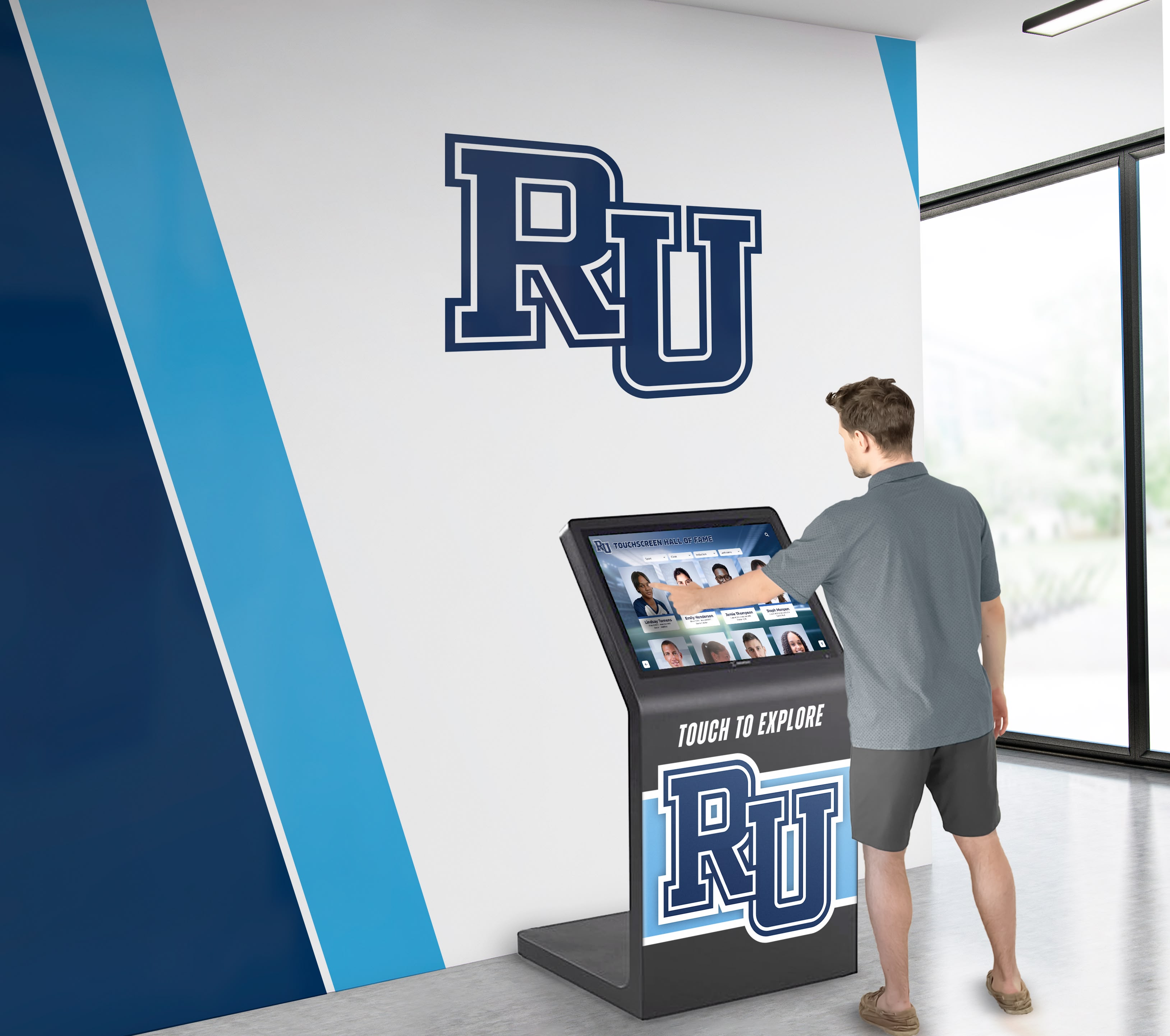
Technology Concerns and Reliability
Challenge: Worry about technical complexity and maintenance requirements
Solutions:
- Select proven platforms with track records in similar organizations
- Prioritize solutions offering comprehensive technical support and training
- Ensure adequate warranties protecting against hardware failures
- Implement proper network infrastructure for reliable connectivity
- Plan preventive maintenance schedules addressing issues before they occur
- Partner with experienced providers offering ongoing technical support
Future Trends in Achievement Recognition Technology
Understanding emerging trends helps organizations plan for long-term evolution and ensure their investments remain relevant.
Artificial Intelligence and Personalization
Emerging Capabilities:
- Personalized content recommendations based on user interests and interactions
- Automated content enhancement from uploaded photos and statistics
- Natural language search understanding conversational queries
- Voice interaction enabling hands-free exploration
- Automatic tagging and content organization reducing manual effort
- Pattern recognition suggesting related content and connections
Extended Reality and Immersive Experiences
Next-Generation Engagement:
- Augmented reality overlays providing additional context on physical displays
- Virtual reality experiences recreating historic moments and championships
- 3D scans of trophies and artifacts enabling virtual examination
- Immersive environments transporting users to significant locations and events
- Interactive timelines providing rich historical context and perspective
Enhanced Social Integration and Sharing
Connected Recognition Experiences:
- Social media integration enabling easy content sharing and engagement
- User-generated content allowing community contributions and memories
- Real-time updates from current competitions and events
- Live streaming integration featuring ongoing performances
- Community commenting and storytelling around achievements
- Alumni networking facilitated through shared achievement connections
Conclusion: Transforming Recognition Through Interactive Technology
Touchscreen achievement displays represent a fundamental evolution in how schools and organizations recognize and celebrate excellence. By eliminating the space constraints, update difficulties, and storytelling limitations of traditional recognition methods, interactive displays create more engaging, comprehensive, and inspiring recognition experiences that serve current participants, honor past achievements, and inspire future excellence.
The investment in modern achievement recognition technology delivers returns across multiple dimensions: operational efficiencies from simplified content management, enhanced engagement from interactive exploration, strengthened institutional pride from comprehensive recognition, and preserved legacy through digitized historical achievements that might otherwise be lost or forgotten.
Whether your organization seeks to modernize athletic recognition, celebrate academic excellence, or create comprehensive achievement displays spanning all domains of accomplishment, touchscreen display technology provides proven solutions that organizations of all sizes and budgets can successfully implement.
Solutions like Rocket Alumni Solutions specialize in creating customized interactive recognition systems designed specifically for schools and organizations seeking to celebrate their all-stars and top performers through engaging digital experiences. Their comprehensive platforms combine intuitive touchscreen interfaces, powerful content management tools, and proven implementation expertise to ensure your recognition program delivers exceptional results and lasting value.
Ready to transform how your organization celebrates achievement? Explore interactive recognition solutions and discover how touchscreen achievement displays can honor your all-stars while inspiring the next generation of excellence.
